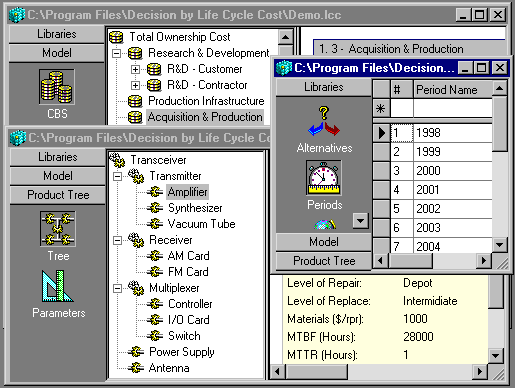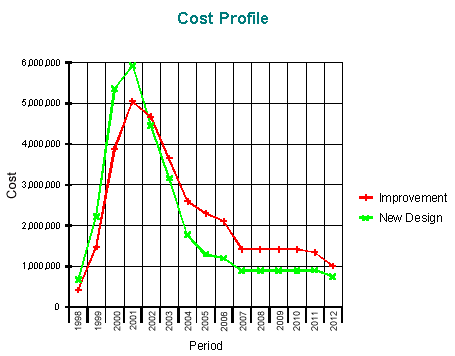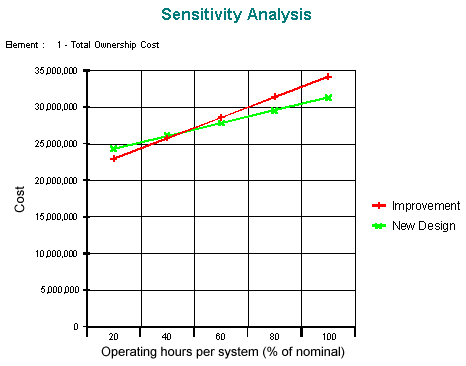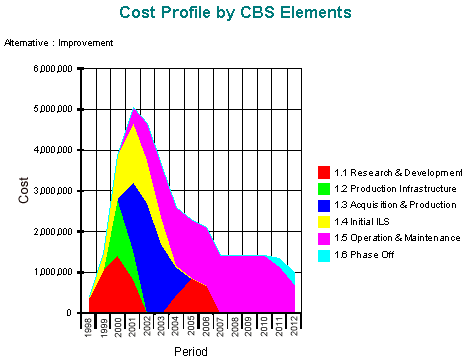Decision by Life Cycle Cost
Life Cycle Costing
Life Cycle Cost (LCC) analysis and Total Cost of Ownership evaluation are the basis for decision making for the wide range of industries and equipment: from IT systems to submarines. LCC analyzes the total ownership costs of various design alternatives and system's components over the projected life cycle of a system.
D-LCC (Decision by Life Cycle Cost) makes the LCC analysis easy and comprehensive. D-LCC is a key tool for managers, decision-makers, engineers, ILS personnel, and other staff involved in system acquisition, proposal writing, management, development, production and through-life support.
Total Cost of Ownership
Total Cost of Ownership and Life Cycle Cost analysis with D-LCC:
• Evaluation and comparison of alternative design approaches
• Comparison of alternative strategies
• Identification of cost effective improvements
• Project's budget and economic viability assessment
• Long term financial planning
Life Cycle Cost is defined by using a supplied or creating a new Cost Breakdown Structure (CBS) and allocating cost variables to each CBS primary element. D-LCC provides bottom-up cost estimating, supports detailed examination of the costs and parameters affecting LCC, and performs Net Present Cost analysis.

D-LCC combines the Cost Breakdown Structure (CBS) with Product Breakdown Structure (PBS) and applies the bottom-up calculation incorporating the time-scale (life cycle phases).
Cost Analysis
• D-LCC allows the user to apply pre-defined LCC models as well as to create new Cost structures and models. An existing CBS can be easily tailored to meet all needs of any particular project.
• Product Tree Cost Calculation option allows for incorporating the Product Tree parameters in LCC model and calculating any required cost elements (like spare parts cost for each Level of Repair) across all Product Tree items.
State-of-the-art Features and Options
Net Present Cost (NPC):
In financial and budgetary analysis, a necessary requirement is to identify the present value of future cash flows called Net Present Cost. The NPC analysis also provides comparison of options with different inflation and discount rates, and is enhanced through sensitivity analysis of these rates.
Cost Profile Analysis:
D-LCC supports detailed examination of dynamics of future cash flows over multiple time periods.

Cost Profile Evaluation
Sensitivity Analysis
D-LCC Sensitivity Analysis option in computes changes in the LCC/TCO according to changes of any global variable. The sensitivity analysis identifies major cost drivers (Pareto "vital few"), supports trade-off analysis and indicates the effect of altering critical parameters and assumptions.

Sensitivity Analysis
Cost-Effectiveness Evaluation
Managers are interested in cost-effectiveness which is typically calculated in terms of performance per unit cost. D-LCC's Cost-Effectiveness module provides this insight as well as other effectiveness measures.
Cost Item Analysis
D-LCC provides a utility to calculate the costs of a particular budget line item. This "Cost Item" function computes the contribution of any item, such as labor, or material. Results are reported at the element level and rolled up into a project total.
Optimal Repair Level Analysis (ORLA)
D-LCC includes a powerful ORLA module for calculating the cost and effectiveness of various Level of Repair alternatives per product tree item, thus supporting optimal decision making.
Main Reports and Analyses Available in D-LCC
• Total and Detailed Costs
• Cost Profile
• Cost Profile by Elements
• Cost-Effectiveness
• Basic CBS Tree
• Optimal Repair Level Analysis
• Versatile User-definable Graphs and Tables

Cost Profile by Cost Elements
Convenience and Ease of Use
• Graphical representation of Cost Breakdown Structure providing convenient and fast data input and search
• Spreadsheet-like, easy to modify cost models for each CBS element
• Drag-and-drop and cut-paste for copying and editing of CBS and PBS elements
• Automatic calculation of total cost by alternative and period
• Powerful Expression Builder for the calculating algorithm creation
• Global change for all required elements -- by changing a global variable, the user can immediately update many items throughout the project.
D-LCC's libraries make the LCC analysis procedure highly efficient:
• Alternatives library -- a list of all possible alternative decisions, policies, etc.
• Periods library -- a list of future periods or life cycle phases
• Global Variables library -- a set of Global Variables valid throughout the cost model and affecting many cost elements, e.g. escalation and discount rates.
D-LCC is data compatible with other ALD packages for Reliability, Maintainability and Logistics Analysis such as RAM Commander.
